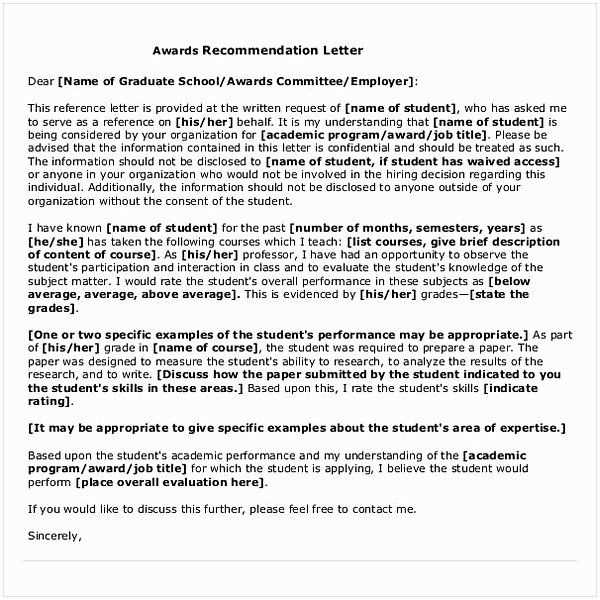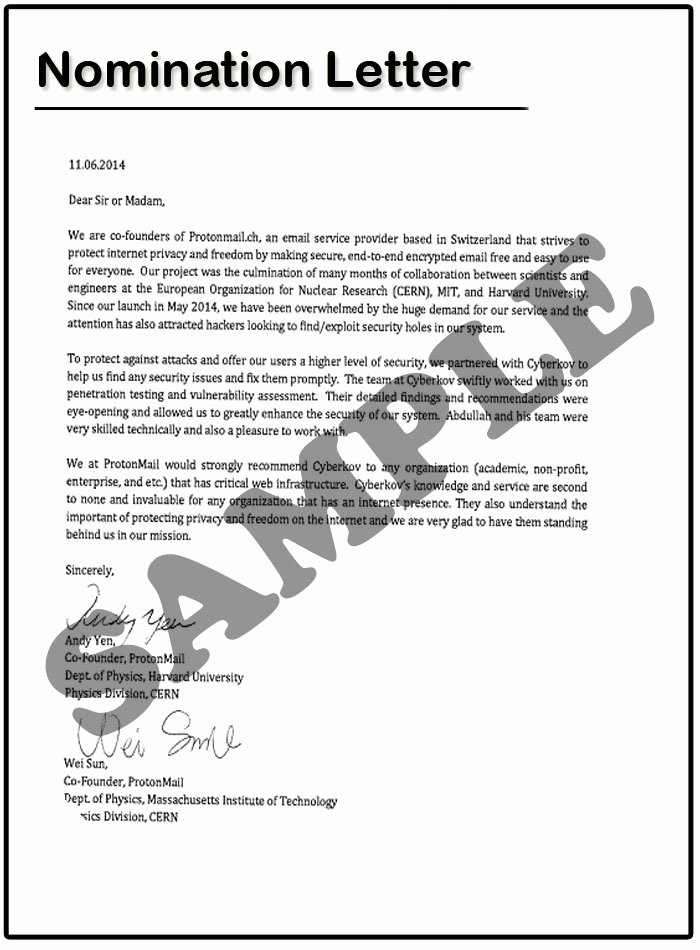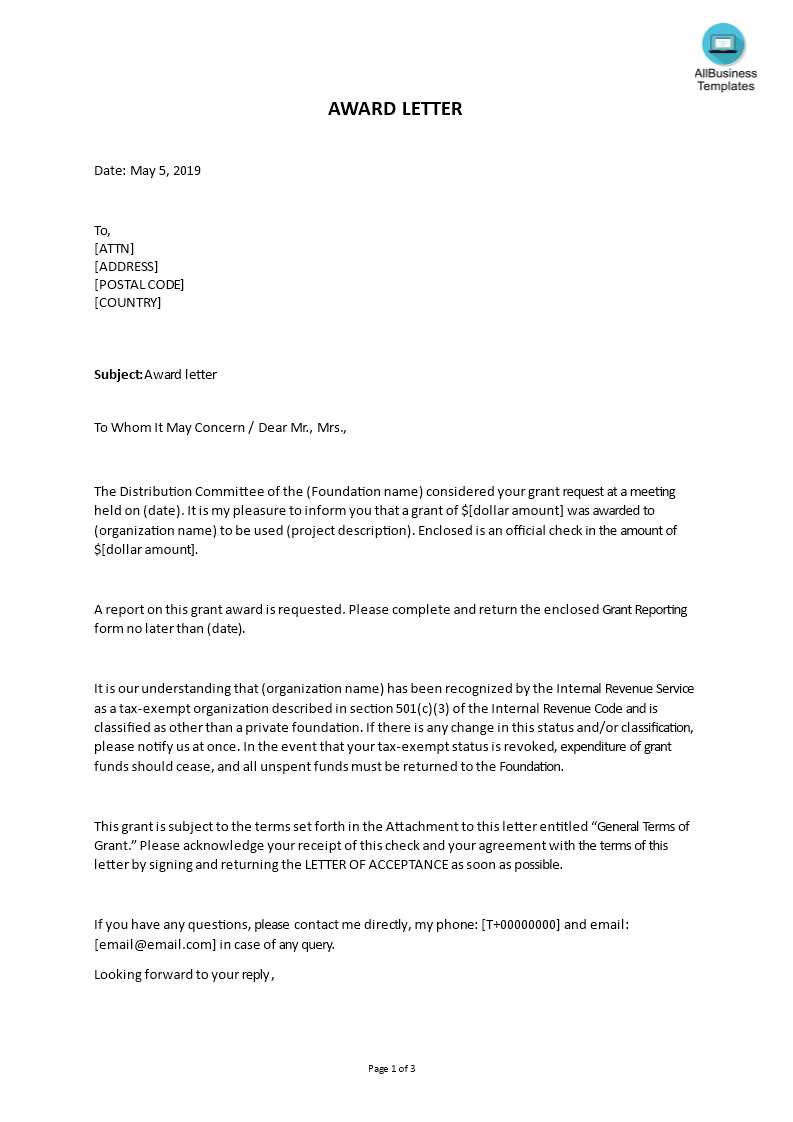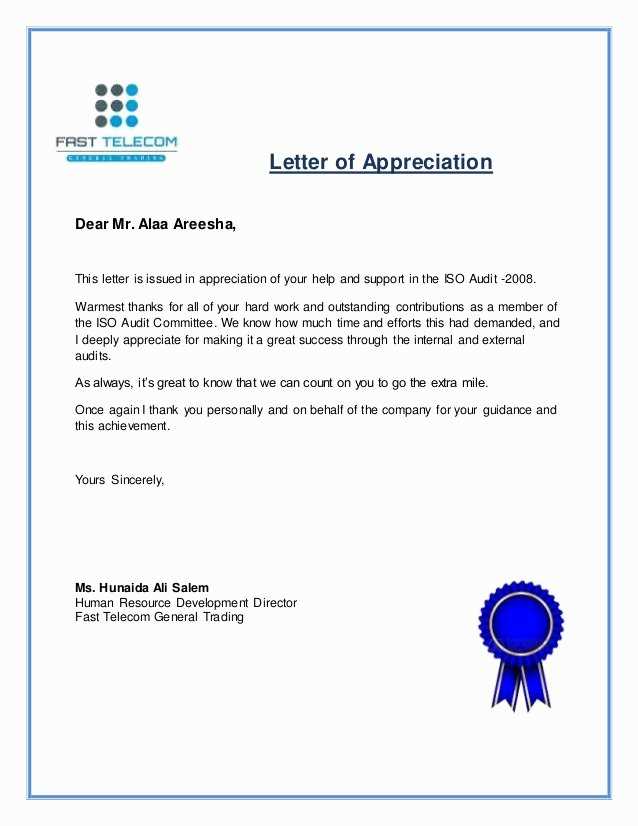Letter of Support for Award Template Guide

Crafting a compelling letter that advocates for someone’s achievements can play a crucial role in their recognition. It is important to convey their strengths and contributions in a clear and impactful manner. This type of correspondence is essential in demonstrating why an individual deserves to be considered for a particular honor or position.
Whether you’re asked to vouch for a colleague, friend, or employee, understanding the structure and key components of such documents is vital. A well-written recommendation can highlight the individual’s skills, qualities, and accomplishments in a way that resonates with the recipient.
Personalization is one of the most important factors in creating a persuasive letter. Customizing your message to fit the specific context or achievement ensures that it feels genuine and relevant. In this guide, we will explore various strategies for writing a thoughtful and effective recommendation that can help someone stand out from the crowd.
Understanding the Importance of Support Letters

Having someone vouch for your qualifications can make a significant difference in your professional or personal journey. A well-written endorsement can elevate your credibility and showcase your achievements in ways that might not be immediately apparent in other forms of documentation. Such written commendations are often a deciding factor in competitive selections and can serve as a powerful testament to your abilities.
These documents go beyond simply listing accomplishments; they offer a deeper insight into your character, work ethic, and potential. A strong endorsement provides context, illustrating not only what you have achieved but also how your actions have impacted others. In many cases, it can be the key to unlocking opportunities that might otherwise remain out of reach.
Personal connections within these types of recommendations further enhance their value. When an endorsement comes from a respected individual, it carries weight and builds trust. The trust conveyed through these personalized messages can tip the scales in favor of the individual being recommended.
How to Structure a Support Letter

When composing a compelling endorsement, the structure plays a crucial role in delivering the message effectively. A well-organized document helps convey key points in a clear and concise manner. By following a logical format, you ensure that the recipient can easily follow the narrative and understand the significance of the person being recommended.
Start by introducing the subject and their relationship to you. Clearly state how long you have known them and in what capacity. This establishes credibility and context for the recommendation.
Next, focus on specific accomplishments or qualities that make the individual stand out. Use examples to highlight their skills, achievements, and personal traits. This section should demonstrate why they are deserving of recognition or consideration.
The concluding part should emphasize the person’s potential and why they would be a valuable asset. Offer a strong closing statement that reinforces your endorsement.
- Introduction: Establish your relationship with the individual and the purpose of your recommendation.
- Main Body: Discuss key qualities, achievements, and experiences that support the recommendation.
- Conclusion: Summarize why the person deserves recognition and offer your strong endorsement.
Key Elements in Award Recommendation Letters
When crafting a persuasive recommendation, it’s important to focus on the core elements that can effectively highlight an individual’s strengths and qualifications. The most impactful documents don’t just list achievements; they emphasize the unique attributes that make the person stand out. Each part should serve to build a compelling case for why the individual deserves consideration.
The introduction should establish the relationship between the writer and the person being recommended. This section provides context for the recommendation and gives the recipient a sense of trust in the writer’s perspective.
Next, focusing on specific qualities and accomplishments is key. Examples of how the individual has excelled in their field or demonstrated exceptional skills will add weight to the recommendation. Highlighting these traits with concrete instances allows the recipient to better understand why the person is deserving of the recognition.
Finally, the conclusion should reiterate the person’s potential and summarize why they are an excellent candidate. Offering a strong closing statement ensures the message remains impactful and leaves a lasting impression.
Tips for Writing a Persuasive Letter
Crafting a convincing endorsement requires careful attention to detail and clarity. To ensure the message resonates, it’s essential to present your points in a way that highlights the person’s abilities, achievements, and potential. By focusing on specific examples and maintaining a strong, confident tone, you can create a compelling case for their recognition.
One important strategy is to personalize the message. Tailor your endorsement to fit the individual’s unique qualities and the context in which they are being considered. A personalized approach adds credibility and makes the recommendation more impactful.
Another key tip is to use clear, concise language. Avoid unnecessary complexity and focus on making your points easy to understand. A well-organized structure, with clear sections outlining the person’s strengths, will help maintain the reader’s attention and strengthen the overall argument.
Lastly, ensure the tone remains positive and confident throughout. Emphasizing the individual’s potential and value can leave a lasting impression and increase the likelihood of success.
Common Mistakes to Avoid in Support Letters
When writing an endorsement, it’s crucial to avoid certain pitfalls that can weaken the impact of your message. A poorly written or unclear recommendation can undermine the person’s chances of success. Recognizing and addressing common mistakes is essential to crafting a compelling and professional endorsement.
One of the most frequent errors is being overly vague. General statements like “They are a great person” don’t provide enough context or examples to back up the claim. Instead, focus on specific qualities or achievements that directly support the recommendation.
Another mistake is being too brief or not elaborating enough on the individual’s qualities. While brevity can be important, failing to provide sufficient detail can make your endorsement seem less genuine or well-thought-out.
A third common issue is using overly complex language or jargon. A recommendation should be clear and accessible to anyone reading it. Avoid technical terms or convoluted sentences that could confuse the reader or detract from your message.
Finally, it’s essential to avoid exaggeration. While it’s important to highlight the person’s strengths, unrealistic claims or overly grand statements can reduce your credibility. Stick to accurate and well-supported points to maintain trust and authenticity in your recommendation.
Customizing Templates for Specific Awards

Adapting a general endorsement to suit a particular recognition or program is essential for ensuring that your recommendation aligns with the criteria and expectations of the selection committee. Customizing your message makes it more relevant, persuasive, and tailored to the specific needs of the recognition being sought.
Start by reviewing the requirements and goals of the specific program or recognition. Understand what qualities or accomplishments are prioritized and how they relate to the individual being recommended. This will allow you to focus on highlighting the most pertinent traits or achievements.
Personalization is key. While a generic endorsement might work in some situations, a customized one demonstrates a deeper understanding of the recipient’s qualifications. Emphasize how their unique strengths directly align with the goals and values of the specific recognition.
Additionally, consider the tone and style of the endorsement. Different programs may require a more formal or casual approach, depending on the nature of the award or recognition. Adjusting the language to suit the tone of the specific occasion will make your message more fitting and impactful.